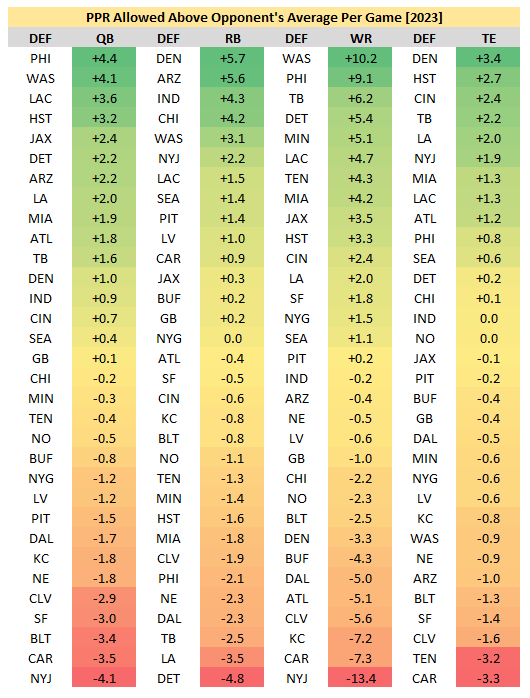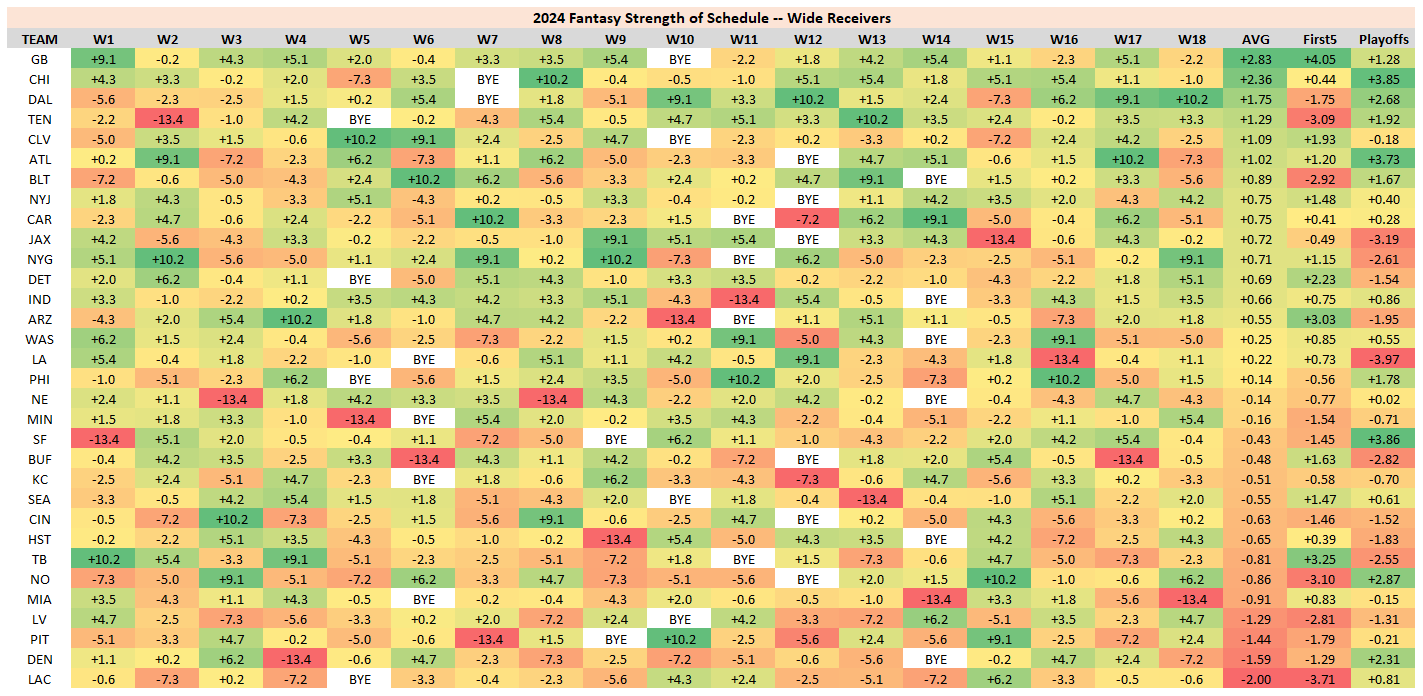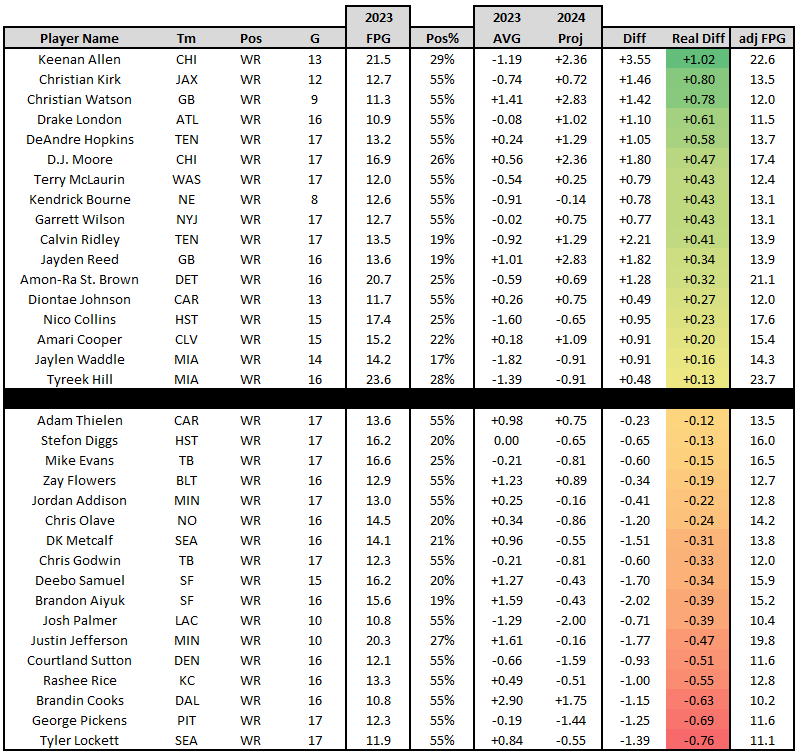Stay ahead in your fantasy football league by understanding the crucial strength of schedule changes that could alter player performance at the wide receiver position!
Which wide receivers have the toughest or easiest fantasy schedules this year? Which wide receivers had the toughest or easiest schedules last year? Or what about the toughest or easiest schedules in the fantasy postseason? Or to start the season? Which wide receivers saw their schedules improve the most or least? How big of an impact was that change in schedule? Can we quantify that change in real terms using fantasy points?
Luckily for our subscribers, we can answer all of these questions and more. But in order to do so, we first had to quantify strength of schedule. This is typically done by calculating a defense’s FPG allowed average and then looking at the average for all players over a full season. This will also be our approach; however, we’ll be taking things one step further – we’re going to use a control for the opposing offense by measuring FPG over an opponent’s average.
For instance, last season, opposing wide receivers averaged +6.6 fantasy points per game over their season-long average when facing Tennessee, which ranked worst in the league. (The Titans were the most favorable fantasy matchup for opposing wide receivers; worth, on average, an additional 6.6 fantasy points per game.) On the opposite end of the spectrum, wide receivers fell short of their season-long average by 10.3 fantasy points when facing the Jets, which ranked best in the league. (The Jets were the toughest fantasy matchup for opposing wide receivers.) Calculating these numbers for all teams and then applying the full-season average for all players quantifies in real terms which players had the easiest and most difficult schedules for fantasy last year. We can also use these numbers to project out strength of schedule for each team and each position in 2024.
Ah, then, you might ask: “Do defenses get defined as ‘tough’ matchups because bad WR play against them is dragging the numbers down?” Not for this study. The strength of schedule average used in this study controls for the quality of the opponent by eliminating a team’s own WR performance against each specific defense. So, this SOS study filters out the notion that the WR being studied was responsible for his own schedule difficulty.
While this methodology isn’t perfect — of course, roster turnover and coaching changes will complicate things — strength of schedule doesn’t not matter. This data is still far more actionable than it is not. In fantasy football — like in poker — there may only be small edges to be gained, but those small edges can be compounded to yield a massive advantage. And they must be taken advantage of … and are, by the most dominant players. That’s the case with strength of schedule. It’s another small edge to be realized, and at the polar extremes, it might matter a lot more than you’d expect.
Here’s an example: last season, Keenan Allen had the 4th-toughest schedule among all fantasy wide receivers. His average matchup last year was worth -1.19 [team wide receiver] FPG. Because he was responsible for roughly 29% of the fantasy points generated by Los Angeles’ wide receivers last year (in games played), we can say that — adjusted for strength of schedule, or if he had a perfectly neutral strength of schedule last year — he would have scored an additional +0.34 fantasy points per game.
Looking forward, Bears WRs have the 2nd-softest strength of schedule (+2.36). Factoring in both points, Allen’s schedule is much improved (most improved at the position) and worth a boost of +1.02 FPG (adjusting for usage). In other words, if he had this schedule last year, he would have finished just 1.3 FPG off of CeeDee Lamb for the position-high.
Clearly, strength of schedule – something totally outside of a player’s control and entirely due to luck – can have a big impact for fantasy.
Other Positions
Quarterbacks (click here)
Running Backs (click here)
Tight Ends (click here)
Best Overall Schedule (2023)
1. Brandin Cooks, Average Matchup: +2.90
2. CeeDee Lamb (+1.94)
3. Odell Beckham Jr. (+1.79)
4. Justin Jefferson (+1.61)
5. Brandon Aiyuk (+1.59)
Worst Overall Schedule (2023)
1. DeVante Parker (-3.07)
2. Jaylen Waddle (-1.82)
3. Quentin Johnston (-1.80)
4. Noah Brown (-1.79)
5. Nico Collins (-1.60)
2024 Schedule
PDF and CSV downloads available here.
Best Overall Schedule (Weeks 1-17)
1. Packers WRs (+2.83)
2. Bears WRs (+2.36)
3. Cowboys WRs (+1.75)
4. Titans WRs (+1.29)
5. Browns WRs (+1.09)
Worst Overall Schedule (Weeks 1-17)
1. Chargers WRs (-2.00)
2. Broncos WRs (-1.59)
3. Steelers WRs (-1.44)
4. Raiders WRs (-1.29)
5. Dolphins WRs (-0.91)
Off to a Hot Start (First Five Games)
1. Packers WRs (+4.05)
2. Buccaneers WRs (+3.25)
3. Cardinals WRs (+3.03)
4. Lions WRs (+2.23)
5. Browns WRs (+1.93)
Slow Starters (First Five Games)
1. Chargers WRs (-3.71)
2. Saints WRs (-3.10)
3. Titans WRs (-3.09)
4. Ravens WRs (-2.92)
5. Raiders WRs (-2.81)
Best Playoff Schedule (Weeks 15-17)
1. 49ers WRs (+3.86)
2. Bears WRs (+3.85)
3. Falcons WRs (+3.73)
4. Saints WRs (+2.87)
5. Cowboys WRs (+2.68)
Worst Playoff Schedule (Weeks 15-17)
1. Rams WRs (-3.97)
2. Jaguars WRs (-3.19)
3. Bills WRs (-2.82)
4. Giants WRs (-2.61)
5. Buccanneers WRs (-2.55)
Schedule Change (In Real Points)
Most Improved Schedule
1. Keenan Allen (+1.02)
2. Christian Kirk (+0.80)
3. Christian Watson (+0.78)
4. Drake London (+0.61)
5. DeAndre Hopkins (+0.58)
Least Improved Schedule
1. Tyler Lockett (-0.76)
2. George Pickens (-0.69)
3. Brandin Cooks (-0.63)
4. Rashee Rice (-0.55)
5. Courtland Sutton (-0.51)
Thoughts / Notes / Dank Stats
1) Although Keenan Allen will benefit from an improved strength of schedule, that will obviously be more than offset by increased target competition. Still, his ADP WR30 ADP is stupidly low.
Even at this stage of his career (age: 32), Allen is still easily one of the best separators in the NFL and a proven target hog. Allen finished as last year’s WR3 by FPG (21.1), and he’s finished top-12 in FPG in each of his last seven seasons. So, that WR30 ADP is 27 spots lower than where he finished last year, or 18 spots lower than he’s finished in any season since 2017.
Given Allen’s dominance against zone coverage – which the NFL deployed at a 74% clip last year – and especially his dominance relative to that of D.J. Moore, I’d be surprised if Allen didn’t lead Chicago in targets this year. So obviously, I much prefer Allen at cost to Moore (ADP: WR18).
2) If you were looking for yet another reason to join Adam Schefter in fading George Pickens (ADP: WR28), he also has the 2nd least-improved schedule of any WR (-0.69). As much as I may believe in Pickens’ talent, I have a hard time getting excited about him in the Drake London role of Arthur Smith’s Russell Wilson-led offense. (London cleared 13.0 half-point PPR fantasy points only 5 times throughout his 33-game career, despite ranking 13th in TPRR over this span.)
Our guy @AdamSchefter is FADING George Pickens in #FantasyFootball this year! 🚨
— Fantasy Points (@FantasyPts) May 21, 2024
Adam joined @Fantasy_Guru and @DrakeFantasy to discuss the #Steelers situation and much, much more! 🔥 pic.twitter.com/hSyKw5mDrW
3) Christian Kirk was a big winner this offseason. In addition to having the 2nd most-improved schedule (+0.80), he will also benefit from the departures of Calvin Ridley and Zay Jones. Those two WRs combined for 200 targets last year and have been replaced by two low-target-earning clear-out options in the historically incompetent Gabe Davis and the uber-raw Brian Thomas Jr.
Despite the tougher target competition last year, Kirk ranked 14th in YPRR (2.31) and 15th in FPG (14.7) over his last 10 healthy games. He’s currently priced as just the WR31 on Underdog.
4) Tyler Lockett is an undeniable value on Underdog, priced as just the WR52. Last year Lockett finished as the WR32 in PPR, and before that finished top-16 in four straight seasons. And he’s perfect for the best ball format – over this span only four WRs have more games with 26.0-plus fantasy points. That said, the argument is tougher to make in start/sit leagues, where his lack of league-winning potential becomes a larger determining factor. Lockett is now 32 years old, Jaxon Smith-Njigba will likely have a much bigger role than he did this past year, and no WR’s schedule has gotten tougher than Lockett’s (-0.76).
5) Rashee Rice has the 4th least-improved schedule this year (-0.55). But it’s tough to tell what exactly his schedule looks like without knowing how long he’s going to be suspended. And ultimately, his difficult strength of schedule is just a minor point in the evaluation.
On one hand, Rice is priced as just the WR44, even though I might have been drafting him in Round 2 had he never got into league trouble and had the Chiefs never drafted Xavier Worthy. Last year, Rice finished 10th in YPRR (2.62) – a historically great mark for a rookie. And he ranked as the WR8 from Week 12-on by FPG (18.6).
Top Rookie WR Seasons by YPRR
— Scott Barrett (@ScottBarrettDFB) January 3, 2024
+ min. 200 routes since 2010
1 Odell Beckham, 2014 (2.75)
2 AJ Brown, 2019 (2.67)
3 Justin Jefferson, 2020 (2.66)
4 PUKA NACUA, 2023 (2.59)
5 Ja'Marr Chase, 2021 (2.51)
6 Chris Olave, 2022 (2.42)
7 RASHEE RICE, 2023 (2.39)
8 Tyreek Hill, 2016 (2.28)
On the other hand, NFL Insider James Palmer is expecting Rice to miss half of the year. And the Chiefs may have just drafted the perfect replacement in Xavier Worthy. (There’s a lot of redundancy in terms of how Rice was used last year and how Worthy was used in college.) Rice was obviously terrific for fantasy last year, but this might have been more largely due to his hyper-valuable role than his actual skillset – last year, 24% of Rice’s catches came on screens (3rd-most of 81-qualifying WRs). Without screens, Rice would have eclipsed 60 yards just three times, and eclipsed 5 receptions only once.
6) Drake London has the 4th most-improved schedule of any WR, worth a boost of +0.61 FPG in real terms. Beyond that, the upgrade from Desmond Ridder to Kirk Cousins feels worth a boost of almost +6.9 FPG. Then, the upgrade from HC Arthur Smith to (my former co-worker) OC Zac Robinson feels worthy of a +4.20 boost. Add it all up, and it’s not hard to see why London now ranks as the ADP WR10 after finishing just 43rd in FPG last year (10.9).
We know London is a high-end target earner, ranking 13th-of-116 qualifying WRs in TPRR over the last two years (0.25). The problem is, Smith’s slow-]aced, run-heavy offense didn’t result in a lot of routes run for London. And when Desmond Ridder actually threw the ball, a high percentage of London’s targets were uncatchable. Unfortunately, all of this feels already priced in at his WR10 ADP. He’s not a bad pick at that cost, but I wouldn’t quite call him a target.
7) Christian Watson will benefit from the 3rd-most-improved strength of schedule this year (+0.78). And I’m hoping this isn’t just “take lock,” but I start drooling every time I look at his WR47 ADP. At that price, Watson offers unrivaled upside. And the risk is almost irrelevant in light of his uber-compelling upside-argument. Basically, I wasn’t wrong to love him last year. I just ran bad on injury luck.
2022 WR Class by Career FPG
— Scott Barrett (@ScottBarrettDFB) May 23, 2024
+ in games with a route share >60%
1. Christian Watson (15.4) [ADP WR47]
2. Chris Olave (13.7) [WR12]
3. Garrett Wilson (13.2) [WR8]
4. George Pickens (11.0) [WR28]
5. Drake London (10.8) [WR10]
9) DeAndre Hopkins will benefit from the 5th-most-improved strength of schedule, and he’ll – more importantly – benefit from new HC Brian Callahan. In games with Will Levis last year, DeAndre Hopkins ranked 8th in XFP/RR (0.54) and tied for 13th in FP/RR (0.54). However, this didn’t perfectly translate into fantasy points because former HC Mike Vrabel was so stubbornly run-heavy – the Titans ranked 5th-worst in PROE (-3.2%). Even with the arrival of Calvin Ridley factored in, Hopkins is an extreme value at his WR46 price tag on Underdog.
10) Chris Olave was already an obvious regression candidate. Last year, with Derek Carr dinged up for much of the season (lingering shoulder injury, concussion, back), Olave ranked 16th in XFP/RR (0.48) but only 25th in FP/RR (0.45). I doubt I’ll end up drafting too much of him, as he seems a tad over-priced as the ADP WR12. But I do like him a lot as an ideal buy-low trade-target mid-season. The Saints have the toughest start to the season (-3.10 FPG across their first five games), but the 4th-softest playoff schedule (+2.87).










